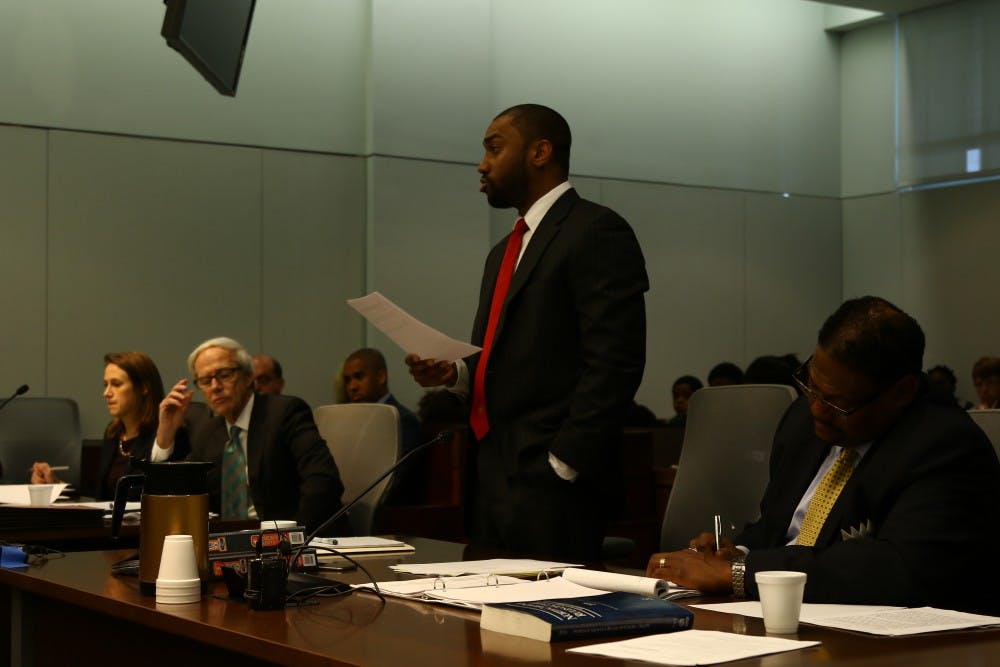Latest updates:
- 3 p.m. Wednesday, April 13—The court ruled in favor of Duke, meaning that the University has been removed as a defendant in the lawsuit, Donald Huggins, attorney for Shelvia Underwood, confirmed.
- 8:20 p.m. Wednesday, April 13—Michael Schoenfeld, vice president for public affairs and government relations, said “the decision speaks for itself” and declined further comment.
- 8:20 p.m. Wednesday, April 13—Danielle Purifoy, a Ph.D. student in environmental policy and member of Duke Students and Workers in Solidarity, which helped organize last week’s Allen Building sit-in, said Duke's defense was inconsistent with Duke University Police Department's typical standards. “There have been several incidents where there have been traffic incidents and the pattern and practice of the DUPD has been to conduct a thorough investigation,” she said. “When you have a police department with the pattern and practice of investigating these incidents and you have this anomaly that involves the EVP, it raises eyebrows.”
- 8:20 p.m. Wednesday, April 13—Earlier this month, administrators claimed that they were unable to go into specifics on certain demands made by sit-in students because of ongoing litigation against the University. Although Purifoy said she was disappointed with the decision, she added that she hopes administrators will now be more willing to negotiate given Duke is no longer a defendant in Underwood’s lawsuit. “I certainly hope that the lawsuit will no longer be used as a barrier to justice for the workers of [Parking and Transportation Services] and the other employees of Duke moving forward,” Purifoy said.
Original story:
Duke asked a court to dismiss parts of the lawsuit filed against it and Executive Vice President Tallman Trask by contract parking employee Shelvia Underwood at a hearing Tuesday.
After Trask hit Underwood with his car and allegedly used a racial slur as he drove off, Underwood filed a lawsuit against Trask with two counts, one for battery and one for negligence. The lawsuit also alleges in a third count that both Trask and the University engaged in a civil conspiracy through “a common scheme” to protect Trask as well as Duke’s financial interests and public reputation. A fourth count against Trask and the University alleges that the defendants obstructed justice by failing to perform a “complete and full investigation” of the incident involving Trask. Duke's attorneys asked that the University be removed as a defendant from the lawsuit.
Underwood was represented at the hearing by Donald Huggins of Hairston Lane PA and the University by Dan Hartzog of Cranfill, Sumner & Hartzog. Superior Court Judge Henry Hight heard arguments regarding the motion and will make his ruling Wednesday.
Duke’s lawyers argued that Underwood’s claim lacked a legal basis to continue against the University and that the facts she alleged about the particular incident could only be litigated in a separate case against Trask.
Hartzog argued that police departments have “discretionary function” to choose what cases to investigate and how the investigations proceed. The Duke University Police Department was never obligated to conduct an investigation, he said, adding that no citizen has a right to sue the police for either not investigating or for conducting an investigation that “didn’t come out the way she wanted it to.”
“If I leave court today and have an intersection accident with the mayor of Durham and the police come out, they don’t have to investigate if they don’t want to and I can’t sue them saying, ‘You should have investigated or you should have done a better investigation than you did,’” Hartzog said. “That is not the law.”
Hartzog further argued that Underwood had signed a document given to her by DUPD detective Arthur Holland agreeing to drop the matter if Trask issued an apology, even if she did not like the apology eventually presented to her.
“She was the reason that it ended,” he said.
Huggins responded, however, that this document should not result in dismissing the case because Underwood was pressured into signing it. Huggins also alleged that the University contacted McLaurin Transportation—Underwood’s employer—pressuring her to drop her complaint.
Hartzog claimed that none of Underwood’s claims against the University rise to the level of warranting damages, and that claims against Trask should proceed separately without the University being a party.
Huggins disagreed, claiming that Duke’s failure to investigate caused Underwood additional “mental anguish and emotional distress,” which are reasons to compensate her as relief.
There is also no explicit evidence of an actual agreement between Trask and the University to obstruct justice, Hartzog said, which would be necessary to allege a civil conspiracy.
Huggins responded that, because DUPD reports to Trask, there is circumstantial evidence that he and Duke could “collude to obstruct justice.” Moving forward with the trial would give Underwood the opportunity to obtain further documentation as part of the discovery process, he explained.
There is a difference between choosing not to investigate and “intentional conduct” that obstructs justice, Huggins added.
Approximately 15 students and staff involved with Duke Students & Workers in Solidarity, the group that led the recent Allen Building sit-in, attended Tuesday’s proceedings.
“The point that they even had the audacity to ask for a dismissal speaks to what Duke is all about and what they have been accustomed to,” said Renee Adkins, a former Parking and Transportation Services special events manager who was one of the employees who alleged that there is a discriminatory environment within PTS.
Check back for updates on this developing story.
Get The Chronicle straight to your inbox
Signup for our weekly newsletter. Cancel at any time.
Adam Beyer is a senior public policy major and is The Chronicle's Digital Strategy Team director.

